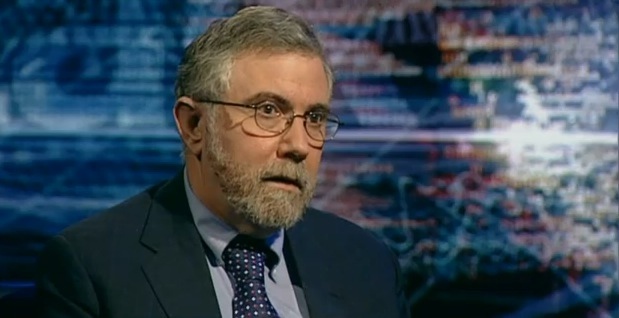

Krugman believes that the government will need to increase spending in order to create jobs. He feels the jobs should come first and that should be the main focus for the government. "Krugman argues that we should put aside our excessive focus on saving money, try to overcome political recalcitrance, and spend money to put America back to work." He is saying that we need to come to reality and try to get America back where we need to be. Rules don't change as fast as they need to to in the economic in order to see progress quicker. Krugman states that the economy is " Not as bad as the Great Depression. It's terrible. We have a persistently depressed economy, persistent lack of jobs...It's a situation where the normal rules of what you-- of economic policy, have to be put on hold, and you really need to do extraordinary stuff." He is saying that we are this far the situation is becoming more worst and serious why isn't no one taking full charge like they need to to make the situation better. Paul states his Opinion on what should be done to bring the economy out of the current "depression". Krugman promotes the need for full employment, meaning a 5% unemployment rate. These jobs which need to be created could include building roads, fixing tracks and anything that could better the environment as well as business which causes the need for hiring. Krugman encourages Obama to read his book and lean towards policies that might promote full employment. Even though Krugman point of view makes perfect send some disagree with Paul Krugman's opinions.
Anti-Krugman

Some people feel like Krugman just makes everything worst in the community and that his opinion doesn't matter. Doesn't it seem more logical, Mr. Krugman, that employers have only a limited amount of money with which they can hire employees? And, perhaps, forcing them to pay each employee more money might force them to discharge some employees in order to cover the new, increased labor cost? It also seems logical, then, that these displaced employees would be less inclined to use any savings they have to purchase the same amount of goods and services. It is even feasible to assume that some employers would not be able to lay off enough workers to continue production, and as a result, would have to raise prices instead (thereby reducing quantity demanded for their product). It is not out of the realm of possibility that this could drive companies who were employing numerous workers out of business entirely.
In my opinion I feel like Krugman is doing the right thing. I am for Krugman. Actually, he’s not quite right there, as I’ll explain in a minute. But it’s certainly true that neither stimulus advocates nor hard-line stimulus opponents have changed their positions. The question is, does this say something about the limits of data — or is it just a commentary on human nature, especially in a highly politicized environment?
Links...
- http://billmoyers.com/episode/full-show-paul-krugman-on-why-jobs-come-first/
- http://krugman.blogs.nytimes.com/
- http://billmoyers.com/episode/full-show-paul-krugman-on-why-jobs-come-first/
- http://krugman.blogs.nytimes.com/2012/12/01/against-willful-denseness-the-gods-themselves-contend-in-vain/
No comments:
Post a Comment